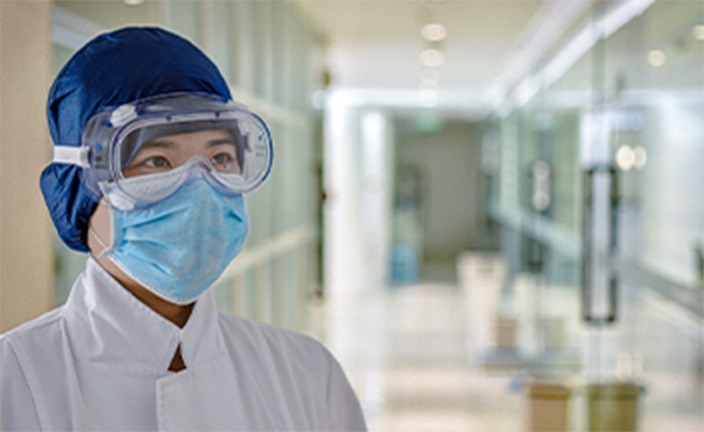How to Ensure Your Veterinary Staff Stays Healthy and Safe for the Duration of COVID-19
Posted by Des Sinkevich on May 20, 2020
Today, companion animals are considered members of the family, and veterinary practices are vital to maintaining the health and happiness of the pets we love. As the world settles into the “new normal” in response to the COVID-19 crisis, essential businesses like vet clinics and hospitals are working ceaselessly to establish a balance between providing customers and clients with service and keeping employees safe. As veterinary healthcare is already a high-stress field for employees, implementing safety measures and following state and federal guidelines isn’t only beneficial for employee mental and physical health - it’s vital to ensuring your practice weathers this unprecedented global event.
With that in mind, understanding how you’re approaching health and safety during the crisis, as well as providing a roadmap for safety for all veterinary practices, is essential.

Practice social distancing while intaking patients
After nearly two months, social distancing has become the norm around the country even as some states move toward slowly “reopening.” For veterinary clinics, that practice involves policies for both staff and clients, which for many has meant following strict patient/staff contact guidelines and implementing hospital-specific curbside check in procedure to intake appointments.
The policy involves three steps.
- Confirm appointments and client health. The reception team contacts the client to verify health. If the client doesn’t exhibit symptoms or hasn’t been exposed to the virus, the appointment is kept as scheduled.
- Intake patients curbside. Veterinary technicians meet clients curbside, in PPE, to collect the patient for examination.
- Ensure clients understand the process. With curbside check in, clients aren’t able to attend the appointment with their companion animal, which can add to an already stressful situation. To ensure as smooth a process as possible, upon intaking patients curbside, techs should let clients know how and when they’ll be contacting them during and after the appointment.
Prioritize employee health and wellness
Veterinary professionals are prone to burnout and compassion fatigue in a business-as-usual environment. Amidst a global pandemic, stress, fatigue, and burnout can be even more likely. Focusing and prioritizing employee health and wellness in veterinary practices is especially vital during these uncertain times. Best practices include:
- Providing PPE to all staff. Masks, gloves, and other personal protective gear are essential to not only following CDC safety guidelines, but to ensuring the protection and well-being of staff. Animal hospital staff should be provided PPE, including well stocked sanitizer, gloves, and more where possible.
- Making sanitizer available at all practices. Use of sanitizer has been emphasized as a method to decrease spread of COVID-19, which has led to shortages in many areas. As an essential business, veterinary clinics should have access to sanitizer and it should be used frequently.
- Flexible paid time off. In the current quarantine climate, workers are often forced to choose between their own health and that of their bank account. The stress of having to decide whether or not you can afford to take a day off combined with normal on-the-job stress in the industry can have a devastating effect on mental health.
- Regular deep-cleaning in practices. In any medical setting, sanitary procedures are a must to ensure the well-being of patients. It’s even more important during a pandemic, even with strict social distancing guidelines in place. Hospitals should be required to sanitize the office every four hours and, should a worker test positive for the virus, hospitals close for at least 24 hours to completely clean and sanitize all spaces.
Leadership should maintain open lines of communication
Whether you’re a small private practice or one branch of a corporate network, regular communication between practice leaders and staff is essential. For a large network, weekly calls between regional leadership has been vital to streamlining curbside intake procedures and more. Decisions are driven by the larger medical team to not only provide services to clients and pets, but to emphasize employee wellness.
Clear communication from leadership down to customer service lends a sense of a calm to a potentially chaotic and overly emotional period. Where possible, setting up regular calls to discuss the health of the practice with leaders and staff can be an effective method to ensure that everyone is on the same page and confident with the procedures in place.
Telemedicine can make a difference
Telehealth isn’t just a service that can be utilized in human healthcare. Offering telemedicine in a veterinary setting can provide an option that keeps client retention strong during a pandemic, while offering further protection to veterinary staffers. Hospitals should use the option if clients have COVID symptoms or have tested positive for the virus and cannot safely use curbside intake services.
However, depending on the capabilities of your unique practice, telemedicine can be more widely used to see all non-urgent appointments. This decreases staff exposure to outside contagion and can be used to bolster productivity when the number of staff on site is limited.
Offering training to staff during the pandemic
Training builds confidence and can make a positive impact on the performance of staff during the pandemic, while preparing employees to take on further duties when and if the world returns to business as usual. Building knowledge in the field as a veterinary assistant, technician, or practice manager can show that the hospital is invested in staff growth. And if there are more workers at home self-isolating or providing telemedicine appointments, there may be more time for them to invest in online training. Additionally, in-depth training can reaffirm the need for proper procedures in sanitation and safety for the practice while keeping employees engaged and focused.
Penn Foster’s Veterinary Academy offers flexible training programs for staff in a variety of roles and can be done around their schedule, from home. To find out more about offering training programs to your staff, contact a Penn Foster training expert today.